2016: the year in Cambridge news
It’s been a busy year for the University of Cambridge. Varsity brings you the highlights
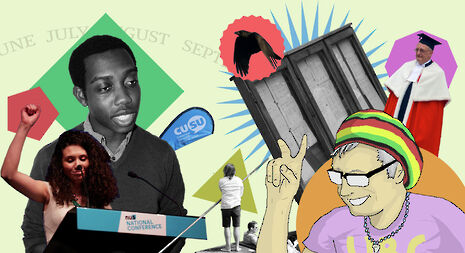
Ups. Downs. Referenda. More referenda. It’s been a busy year for news in Cambridge, packed with political turmoil, new chapters in long-running discussions over cultural appropriation, and surprisingly dramatic governance debates. At several points the University seemed split in two, with clashes over who controls what echoing concerns that have shaped the wider world this year. We’ve picked out some of the most important stories from the last 12 months.
January
The year got off to a bright start with the resolution of Cambridge’s streetlight saga. Following opposition from both students and residents, Cambridge City Council agreed to cover the cost of lighting several key streets at night, avoiding a switch-off.
Girton PhD student Giulio Regeni went missing in Cairo, where he was researching trade unions, in late January. His body was found shortly afterwards bearing wounds which some campaign groups alleged were typical of Egyptian state torture. Later in the year, Egyptian authorities claimed to have found a gang responsible for his abduction and murder, and said that the group had been killed in a shootout with police, but this explanation was questioned by Italian politicians. Egyptian police admitted that they had investigated Regeni’s activities prior to his death. Italian authorities are conducting an ongoing investigation into the case.
February
Cambridge announced that it would be re-introducing entrance tests for all applicants, a move which was criticised by the government’s social mobility tsar. Some sample questions have subsequently been released.
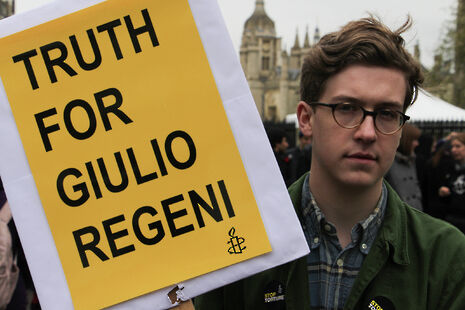
In what was at the time the highest turnout referendum in six years, students voted to create a Disabled Students’ Officer role within CUSU, with Jessica Wing becoming the first officeholder a few months later. However, CUSU’s attempts to fund the role had knock-on effects in Easter Term.
Following a review by the University into graduate representation, the decision was taken to save the Graduate Union, despite CUSU’s drive for a merger of the two students’ unions.
All of Homerton’s Lent Term bops were cancelled after excrement, urine and vomit were found across several residences following an event, along with other damage caused.
Jesus College Student Union put forward a call to repatriate a bronze cockerel, the Okukor, which had been looted from the Benin kingdom of Nigeria. The cockerel is understood to still be in storage at the college, and its future is uncertain.
March
Amatey Doku stormed to victory in the CUSU presidential election, with a majority of over 1,000 votes. Doku triumphed following a controversy-ridden campaign, during which documents emerged accusing one of his opponents, Cornelius Roemer, of having had an abrasive leadership style during his time as Trinity College Student Union President.
Cambridge University Conservative Association (CUCA) voted to create the role of Women’s Officer after its chairman, Samuel Carr, revealed: “it has reached me through others that a few members do not feel as welcome as they might wish.”
Girton’s Spring Ball was cancelled following the death of one of the college’s undergraduate students. Thomas Millward, a first year Engineer, was found at the college with head injuries and died at Addenbrooke’s Hospital the next day.
April
A Varsity investigation revealed that the University was preparing to put forward a grace to abolish the public display of Class Lists, both online and outside Senate House, following student protests. The revelation sparked a debate which culminated in votes of both the students and fellows.
Varsity acquired documents which revealed the arrival of Cambridge’s next Vice-Chancellor (VC), whose name was announced in September, would coincide with a pay rise for the role of up to 38 per cent.
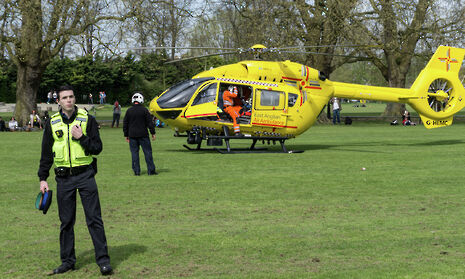
May
A Sidney Sussex fresher was accidentally set on fire during Caesarian Sunday revelries on Jesus Green. The male student was dressed in cotton wool, reportedly as part of an initiation ceremony for a drinking society.
The themes of some May Balls and June Events were met with accusations of cultural appropriation, leading Trinity Hall to change the name of their June Event to ‘Metropolis’, instead of previous title ‘Tokyo to Kyoto’.
Substantial cuts to the print budget of The Cambridge Student (TCS) were proposed in CUSU’s budget, a move which was met with significant opposition from members of the paper’s team. CUSU Council approved changes which would bring the print edition to an end, but before Michaelmas Term an agreement was reached by CUSU President Amatey Doku and TCS’s editors for the student union to finance a fortnightly print edition of the paper.
Later in the month, University staff from the University and College Union (UCU) went on strike over a range of pay-based concerns, including the gender pay gap.
A referendum was called by CUSU on whether Cambridge should remain a member of the National Union of Students (NUS) following Malia Bouattia’s election as NUS President. She had faced in allegations of anti-Semitism following some past comments including calling the University of Birmingham “a Zionist outpost”. Cambridge narrowly voted to remain a member of NUS, with a turnout of 29 per cent, breaking the record set earlier in the year by the Disabled Students’ Officer referendum.
Following the TCS and NUS controversies, a group of Petrean students (“The Peterhouse Seventeen”) called for a vote on Peterhouse JCR’s affiliation with CUSU. They ultimately remained affiliated.
June
CUCA’s first women’s officer accused the society of “aggressive sexism”, and said that she had “faced open ridicule” whilst fulfilling her role.
In the lead up to the UK’s referendum on membership of the European Union, Pembroke College alumna Jo Cox MP was murdered by a right-wing extremist. The college set up a studentship in her memory.
The day before the vote, Gonville & Caius fellow Victoria Bateman arrived at a departmental meeting naked, with ‘Brexit leaves Britain naked’ daubed across her breasts.
After Britain voted for Brexit, Cambridge VC Leszek Borysiewicz, a fervent Remain campaigner, reassured European students that fees would not immediately rise. Robinson’s financial tutor called for Borysiewicz to step down.
The University Council blacklisted investment in coal and tar sands, after a push from pressure group Positive Investment Cambridge. Cambridge’s Zero Carbon Society were dissatisfied with the outcome.
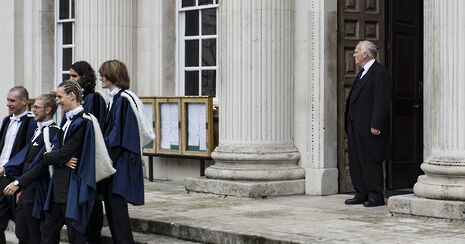
July
The University Council approved a report recommending that the practice of displaying Class Lists be abolished. It submitted a Grace to bring the changes into effect, but this was blocked members of Regent House (mostly fellows and senior administrators), who called a vote. Meanwhile, pro-Lists campaign ‘Save The Class List’ gathered enough student signatures to force CUSU to call a vote on its pro-abolition policy.
August
CUSU languished at the bottom end of the student union satisfaction rankings in the National Student Survey, though they rose to third-to-last place and increased their rating slightly.
September
Cambridge City Council issued a Public Spaces Protection Order, which banned punt touts from operating in much of the city centre. However, the order was broadly ignored, and touts continued to operate on King’s Parade.
Cambridge announced that Stephen Toope would be its 346th Vice-Chancellor. Toope was formerly VC of the University of British Columbia, in Canada. He hates Twitter, and likes Leonard Cohen.
October
Varsity revealed a case of possible EU interference, after chafer bugs and crows were blamed for the destruction of several lawns across the University.
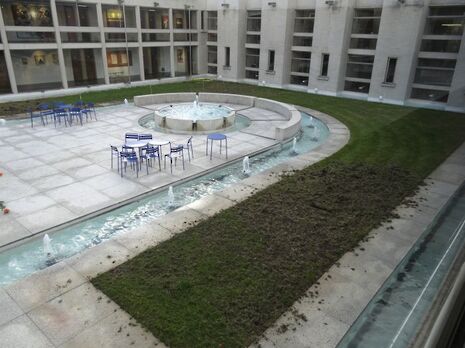
Palestine Society (PalSoc) and the Cambridge Union Society clashed over the decision to invite Israeli ambassador Mark Regev to speak. PalSoc said it was part of a pattern of the Union failing to adequately challenge speakers from Israel.
November
Students voted in a referendum to support the continued publication of Class Lists, on the basis that a simplified opt-out system be made available to students who wished for their results not to be shown. It caused a reversal in CUSU policy.
December
Members of Regent House rejected the Grace to abolish Class Lists, echoing the student vote. The University will establish a working group to look further into the practice.
Cambridge announced that it would participate in the second part of the government’s Teaching Excellence Framework, despite having held early reservations. Cambridge Defend Education have called for students to boycott the National Student Survey to undermine the proposed changes.
The University Council put forward a Grace to propose a significant update to its sexual harassment policy. However, shortly after, it withdrew the Grace, saying it needed further changes.
The year in numbers
● Cambridge in general performed at a high level across league tables, consistently placed fourth in international rankings. Oxford scored more highly in the Times Higher Education ranking, but fell below in the Shanghai and QS rankings. Cambridge topped The Guardian’s league table for the sixth year in a row.
● The number of Firsts awarded was the highest in 50 years, with nearly a third receiving the top result.
● Admissions statistics released this year showed that Cambridge took in its highest proportion of Home students from ethnic minorities, at 20 per cent
 News / Judge Business School advisor resigns over Epstein and Andrew links18 February 2026
News / Judge Business School advisor resigns over Epstein and Andrew links18 February 2026 News / Hundreds of Cambridge academics demand vote on fate of vet course20 February 2026
News / Hundreds of Cambridge academics demand vote on fate of vet course20 February 2026 News / Gov grants £36m to Cambridge supercomputer17 February 2026
News / Gov grants £36m to Cambridge supercomputer17 February 2026 News / CUCA members attend Reform rally in London20 February 2026
News / CUCA members attend Reform rally in London20 February 2026 News / Petition demands University reverse decision on vegan menu20 February 2026
News / Petition demands University reverse decision on vegan menu20 February 2026










